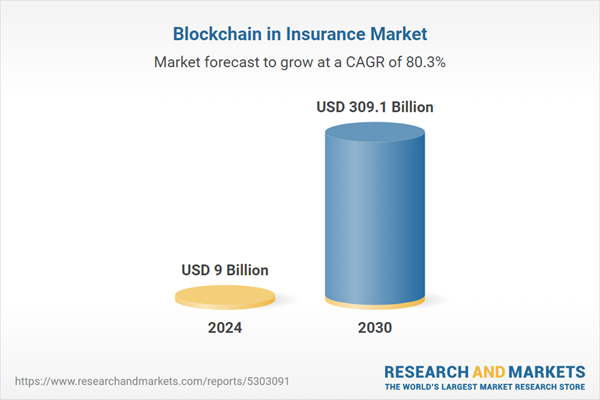Global Blockchain in Insurance Market - Key Trends & Drivers Summarized
How is Blockchain Transforming the Insurance Industry?
Blockchain technology is fundamentally changing the insurance industry by introducing new levels of transparency, efficiency, and trust between insurers, policyholders, and intermediaries. Traditionally, the insurance sector has been burdened by inefficient processes, manual paperwork, fraud risks, and lengthy claims settlements. Blockchain offers a solution by providing a secure, decentralized ledger that ensures all parties involved in an insurance contract can access the same immutable data in real-time. This reduces disputes, increases trust, and streamlines processes. With smart contracts, insurance policies can be automated, enabling instant execution of claims when predetermined conditions are met. For example, in flight delay insurance, blockchain-enabled smart contracts can automatically trigger payments once the flight data confirms a delay, without the need for manual claims filing.One of the key advantages of blockchain is its potential to eliminate fraud, a persistent issue in the insurance industry. By maintaining a decentralized, tamper-proof record of all transactions, blockchain reduces the chances of duplicate claims or falsified records. Insurers can access accurate data on policyholders' history, reducing the risk of fraudulent activities. Blockchain also improves customer experience by reducing processing times for both policy issuance and claims settlements, as it removes the need for intermediaries. In the complex, multi-party world of insurance - whether it's health, property, life, or auto - blockchain simplifies communication and collaboration among stakeholders, including reinsurers, brokers, and third-party service providers. The ability to streamline such complex ecosystems is driving adoption of blockchain technology in the insurance sector globally.
Can Blockchain Help Improve Claims Processing and Efficiency?
Blockchain technology is a game changer in enhancing the efficiency of claims processing within the insurance sector. The traditional claims process is often slow and inefficient, requiring multiple steps involving documentation, verification, and approval from various parties. This can result in long waiting periods and increased operational costs. Blockchain optimizes this process by enabling transparent and real-time data sharing between all parties involved, including insurers, policyholders, and claims adjusters. This reduces delays and administrative overhead. Once a claim is submitted, blockchain-based smart contracts can automatically verify the conditions under which a payout is due and trigger the disbursement of funds, drastically shortening the time it takes for policyholders to receive payments.Furthermore, blockchain facilitates better data management and risk assessment, which are essential in underwriting processes. By using a decentralized ledger, insurers can access a vast array of verified, historical data from various sources - such as financial records, medical histories, and property details - without relying on centralized databases. This reduces the time spent on manual verification and minimizes the risk of human error. Additionally, smart contracts eliminate the need for third-party administrators by allowing policies and claims to be handled directly between the insured and the insurer. This direct interaction reduces transaction costs and enhances efficiency, particularly for complex insurance products such as reinsurance, where multiple parties are involved in a single claim. Blockchain's ability to securely handle vast amounts of data also makes it easier to detect anomalies or discrepancies that could indicate fraudulent activity.
What Role Does Blockchain Play in Enhancing Customer Trust and Transparency?
Blockchain's role in enhancing customer trust and transparency is pivotal, especially in an industry like insurance, where policyholders often feel disconnected from the process and uncertain about outcomes. A significant challenge in insurance is the lack of transparency regarding premiums, policies, and claims processes. Customers are often unaware of how their premiums are calculated or why their claims are delayed or denied. Blockchain addresses these concerns by providing complete transparency, as all transaction records and policy details are stored on a decentralized ledger accessible to all authorized parties. This transparency ensures that customers can track their claims in real-time, understand the status of their policies, and trust that all processes are being conducted fairly.This increased transparency is particularly beneficial in parametric insurance, where policies are triggered by predefined events such as natural disasters or weather conditions. With blockchain, policyholders can be confident that when a trigger event occurs - such as a hurricane reaching a certain intensity or a drought lasting a set period - the smart contract will automatically execute the payout. The blockchain ledger provides a clear, verifiable record of the event, leaving no room for disputes. Moreover, blockchain's ability to securely store and manage sensitive personal data, such as medical records or financial histories, adds another layer of trust, especially in sectors like health insurance. By putting control of data back into the hands of customers, blockchain reduces concerns over privacy and data security, thereby improving the overall customer experience and satisfaction.
What Factors Are Driving the Growth of Blockchain in the Insurance Market?
The growth in the blockchain in insurance market is driven by several factors, including the increasing demand for fraud prevention, the need for operational efficiency, and the shift towards digitalization in the insurance industry. Fraud is a significant problem in the insurance sector, costing billions of dollars annually in false claims and inflated premiums. Blockchain's ability to create an immutable, transparent ledger of transactions drastically reduces the potential for fraudulent activities, as it becomes nearly impossible to alter or falsify data once it has been recorded. This inherent security feature is a key driver behind the rising adoption of blockchain among insurers who seek to mitigate fraud-related losses and improve their overall risk management strategies.Another major factor is the insurance industry's push towards digital transformation. As the demand for digital-first, customer-centric experiences grows, insurers are looking for technologies that can streamline processes and improve service delivery. Blockchain, with its ability to automate processes via smart contracts, reduces the need for manual intervention, lowers operational costs, and accelerates claims settlements. This not only improves operational efficiency but also enhances customer satisfaction by providing faster and more reliable services. In addition, the growing popularity of parametric insurance, where payouts are triggered by predefined events, is further driving blockchain adoption. The technology's capacity to handle real-time data inputs and execute instant payments aligns perfectly with the needs of this emerging insurance model.
The integration of blockchain with other advanced technologies such as artificial intelligence (AI), the Internet of Things (IoT), and big data analytics is also a significant growth driver. AI and IoT, for example, can provide real-time data that feeds into blockchain platforms, enhancing risk assessments and allowing for more personalized insurance products. These innovations are particularly relevant for usage-based insurance (UBI) models in sectors like auto and health insurance, where premiums are calculated based on individual behavior and real-time data. Furthermore, regulatory changes are also propelling the blockchain in insurance market, as governments and industry bodies seek to create more transparent, secure, and efficient financial systems. Blockchain's compliance with emerging regulatory requirements, such as GDPR for data privacy, makes it an attractive option for insurers looking to navigate the complexities of modern regulations while maintaining operational agility.
Report Scope
The report analyzes the Blockchain In Insurance market, presented in terms of market value (US$ Thousand). The analysis covers the key segments and geographic regions outlined below.- Segments: Provider (Infrastructure & Protocols Providers, Application & Solution Providers, Middleware Providers); Application (Smart Contracts, GRC Management, Death & Claims Management, Payments, Other Applications).
- Geographic Regions/Countries:World; United States; Canada; Japan; China; Europe (France; Germany; Italy; United Kingdom; and Rest of Europe); Asia-Pacific; Rest of World.
Key Insights:
- Market Growth: Understand the significant growth trajectory of the Infrastructure & Protocols Providers segment, which is expected to reach US$119.3 Billion by 2030 with a CAGR of a 77.9%. The Application & Solution Providers segment is also set to grow at 83% CAGR over the analysis period.
Why You Should Buy This Report:
- Detailed Market Analysis: Access a thorough analysis of the Global Blockchain In Insurance Market, covering all major geographic regions and market segments.
- Competitive Insights: Get an overview of the competitive landscape, including the market presence of major players across different geographies.
- Future Trends and Drivers: Understand the key trends and drivers shaping the future of the Global Blockchain In Insurance Market.
- Actionable Insights: Benefit from actionable insights that can help you identify new revenue opportunities and make strategic business decisions.
Key Questions Answered:
- How is the Global Blockchain In Insurance Market expected to evolve by 2030?
- What are the main drivers and restraints affecting the market?
- Which market segments will grow the most over the forecast period?
- How will market shares for different regions and segments change by 2030?
- Who are the leading players in the market, and what are their prospects?
Report Features:
- Comprehensive Market Data: Independent analysis of annual sales and market forecasts in US$ Million from 2024 to 2030.
- In-Depth Regional Analysis: Detailed insights into key markets, including the U.S., China, Japan, Canada, Europe, Asia-Pacific, Latin America, Middle East, and Africa.
- Company Profiles: Coverage of players such as Algorythmix, Applied Blockchain, Auxesis Group, AWS, Bitfury and more.
- Complimentary Updates: Receive free report updates for one year to keep you informed of the latest market developments.
Some of the 204 companies featured in this Blockchain In Insurance market report include:
- Algorythmix
- Applied Blockchain
- Auxesis Group
- AWS
- Bitfury
- Bitpay
- Blockcypher
- BTL Group
- Cambridge Blockchain
- Chainthat Limited
This edition integrates the latest global trade and economic shifts into comprehensive market analysis. Key updates include:
- Tariff and Trade Impact: Insights into global tariff negotiations across 180+ countries, with analysis of supply chain turbulence, sourcing disruptions, and geographic realignment. Special focus on 2025 as a pivotal year for trade tensions, including updated perspectives on the Trump-era tariffs.
- Adjusted Forecasts and Analytics: Revised global and regional market forecasts through 2030, incorporating tariff effects, economic uncertainty, and structural changes in globalization. Includes historical analysis from 2015 to 2023.
- Strategic Market Dynamics: Evaluation of revised market prospects, regional outlooks, and key economic indicators such as population and urbanization trends.
- Innovation & Technology Trends: Latest developments in product and process innovation, emerging technologies, and key industry drivers shaping the competitive landscape.
- Competitive Intelligence: Updated global market share estimates for 2025, competitive positioning of major players (Strong/Active/Niche/Trivial), and refined focus on leading global brands and core players.
- Expert Insight & Commentary: Strategic analysis from economists, trade experts, and domain specialists to contextualize market shifts and identify emerging opportunities.
Table of Contents
Companies Mentioned (Partial List)
A selection of companies mentioned in this report includes, but is not limited to:
- Algorythmix
- Applied Blockchain
- Auxesis Group
- AWS
- Bitfury
- Bitpay
- Blockcypher
- BTL Group
- Cambridge Blockchain
- Chainthat Limited
Table Information
| Report Attribute | Details |
|---|---|
| No. of Pages | 308 |
| Published | February 2026 |
| Forecast Period | 2024 - 2030 |
| Estimated Market Value ( USD | $ 9 Billion |
| Forecasted Market Value ( USD | $ 309.1 Billion |
| Compound Annual Growth Rate | 80.3% |
| Regions Covered | Global |









